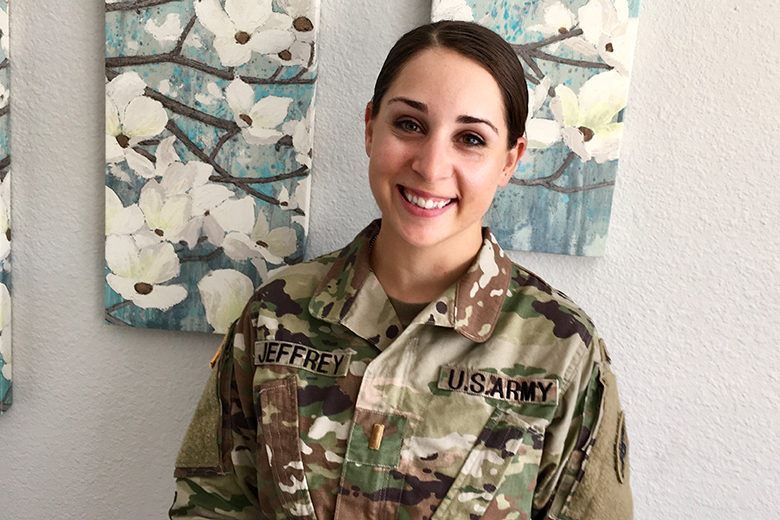
All graduate-level dietetics students expect to carry a challenging load of advanced biochemistry and physiology courses related to nutrition and human health. Renee Jeffrey accepted that challenge — and much more. As a student in the U.S. Military-Baylor graduate program in nutrition, Renee is passionate about supporting our troops’ military readiness. She recommends the military dietetics program for anyone interested in pursuing a different career path with unique challenges, which include proficiency in weaponry, beginning combat training, land navigation and tear gas exposure, to name a few. ![]()
The academic phase of her program is reinforced with a basic officer leadership course, in which Renee focuses on discipline, teamwork, basic soldier skills, tactical medical doctrine and learning the principles behind becoming a resilient, agile leader. The rigors will pay off as she enters the research and internship phase of the program, enabling her to sit for the dietetic registration examination. Eventually, she hopes to help our troops fuel for performance, recovery, rehabilitation and sustained health.
Though her feet are blistered by road marches, Renee says she feels lucky to be in a program surrounded by such amazing peers and cadre. I met Renee while pursing my master’s in nutrition science at the University of Illinois–Chicago. She embraces each challenge with courage, character and commitment and will be a true asset to our military and the dietetics profession.
How did you become interested in pursuing military dietetics?
I became interested after marrying a Marine and working at the Officer’s Club at Camp Lejeune. That was my first experience seeing someone I love serve in the military. I was stunned every day by the sacrifices our service men and women make for their country. I discovered the U.S. Military-Baylor graduate program in nutrition where I could complete my dietetic internship and earn my master’s degree while serving as an active duty Army officer.
How does a military program in nutrition differ from a civilian program?
Academically, the military master’s degree is nearly identical to a civilian degree with the exception that our medical nutrition therapy courses place more emphasis on trauma and burns. The main difference between the military and civilian dietetic internship revolves around our military training.
What would you tell someone interested in pursuing a career in military dietetics?
Army dietitians are soldiers first. Mastering basic warrior tasks is an important part of our initial training. I learned the proper way to carry a casualty on a litter through various obstacles. I now know how to set up a radio and request a MEDEVAC. My platoon learned weapon safety and proficiency. We completed land navigation during the day and night, which consisted of plotting grid coordinates, calculating directions, distances and finding our points within a fixed time frame. Through it all, I’m grateful to be a member of the Army family as a dietitian in training.
The views and information presented are those of the author and do not represent the official position of the U.S. Army Medical Department Center and School, Army Medicine or the U.S. Army.
